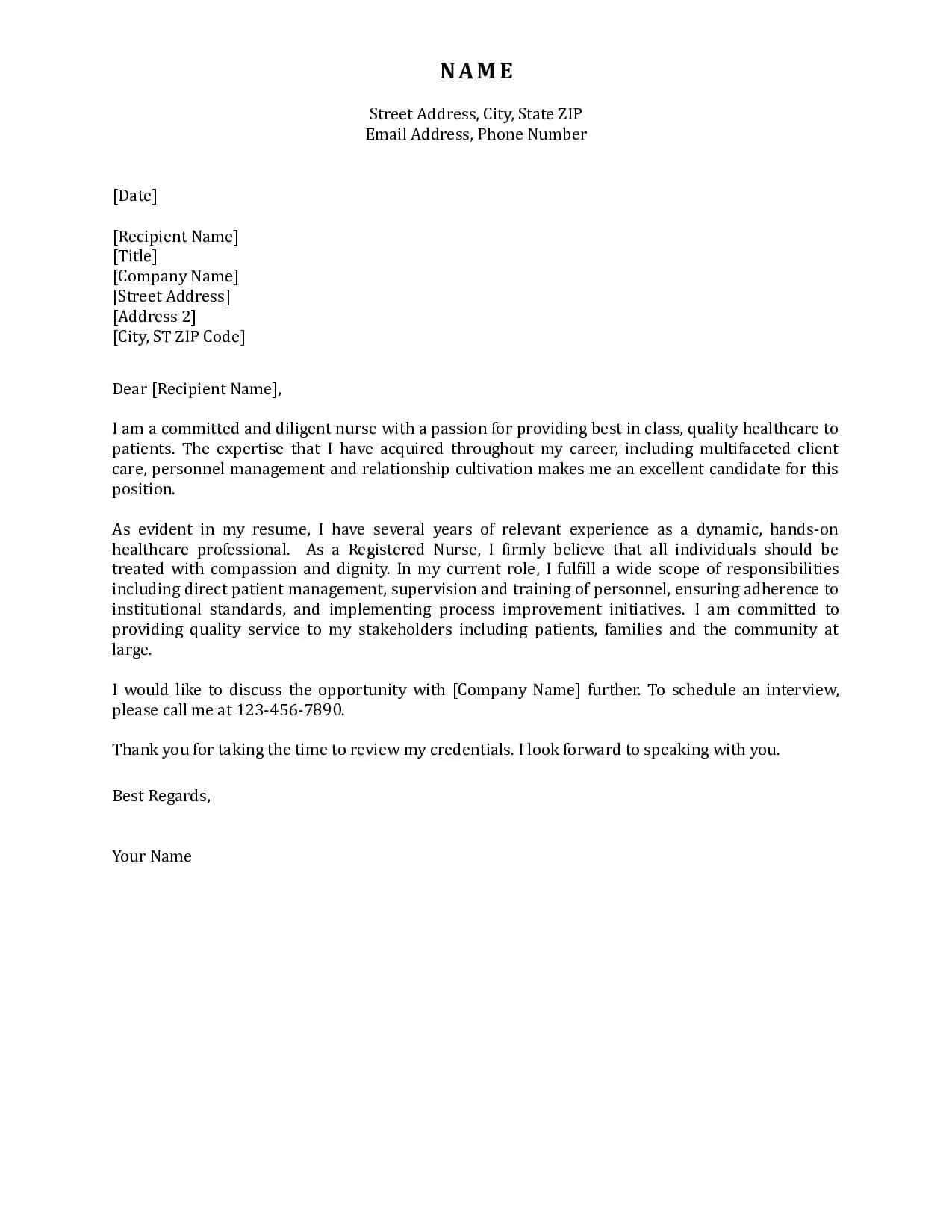Crafting a Compelling Nurse Cover Letter
In the competitive field of nursing, a well-crafted cover letter can be your golden ticket to landing your dream job. It’s your first chance to make a strong impression on potential employers, showcasing your skills, experience, and passion for patient care. A compelling cover letter is not just a formality; it’s a powerful tool that can significantly increase your chances of getting an interview and ultimately, securing the position. This guide will walk you through the essential elements of writing a nurse cover letter that stands out from the crowd, helping you articulate your qualifications effectively and demonstrate why you are the ideal candidate for the role.
Understanding the Purpose of a Nurse Cover Letter
The primary purpose of a nurse cover letter is to introduce yourself and your qualifications to a potential employer. It’s your opportunity to go beyond the information provided in your resume and provide a more personal and detailed account of your skills, experience, and career aspirations. A well-written cover letter complements your resume, offering a narrative that highlights your key strengths and demonstrates how they align with the specific requirements of the nursing position. It should also reflect your personality, enthusiasm, and genuine interest in the role and the healthcare organization.
Why a Nurse Cover Letter is Important
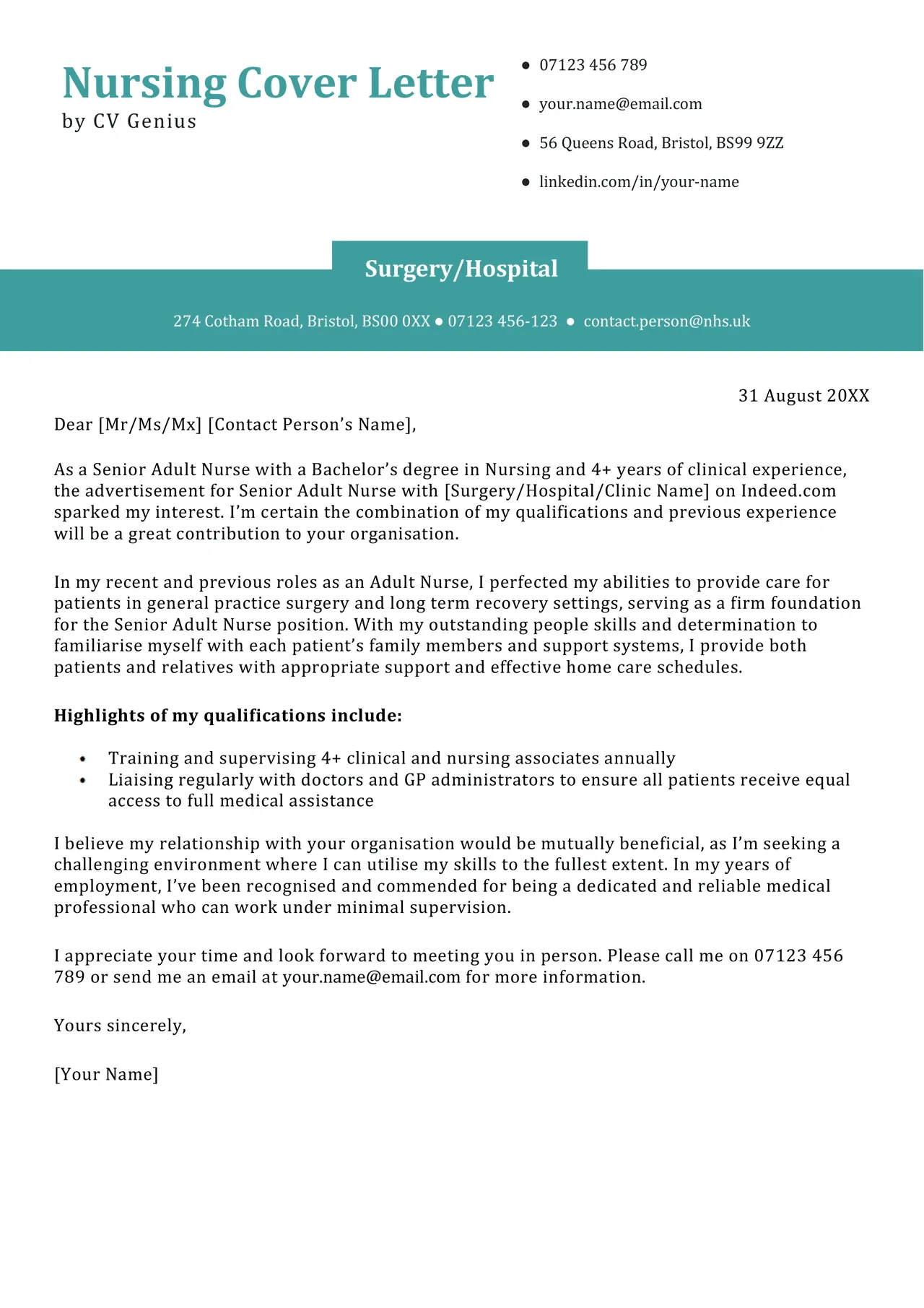
A nurse cover letter serves several critical functions. Firstly, it allows you to demonstrate your communication skills, a vital asset in nursing. Your ability to articulate your thoughts clearly and concisely can reflect your ability to communicate effectively with patients, colleagues, and other healthcare professionals. Secondly, it provides context to your resume. While your resume lists your qualifications, your cover letter provides the narrative that brings those qualifications to life, explaining how your experiences have prepared you for the specific role. Thirdly, it allows you to express your genuine interest in the position and the organization, setting you apart from candidates who may be sending generic applications. Finally, it’s an opportunity to address any gaps in your resume or explain specific career choices.
Key Components of a Nurse Cover Letter
Contact Information and Header
Your nurse cover letter should begin with a professional header that includes your contact information. This section should include your full name, phone number, email address, and optionally, your LinkedIn profile URL. This information should be clearly visible at the top of the letter, making it easy for the hiring manager to reach you. It is best practice to format this section consistently with your resume, using the same font and style to create a cohesive application package. Consider also including the date and the hiring manager’s name and title (if known) and the healthcare facility’s address.
Addressing the Hiring Manager
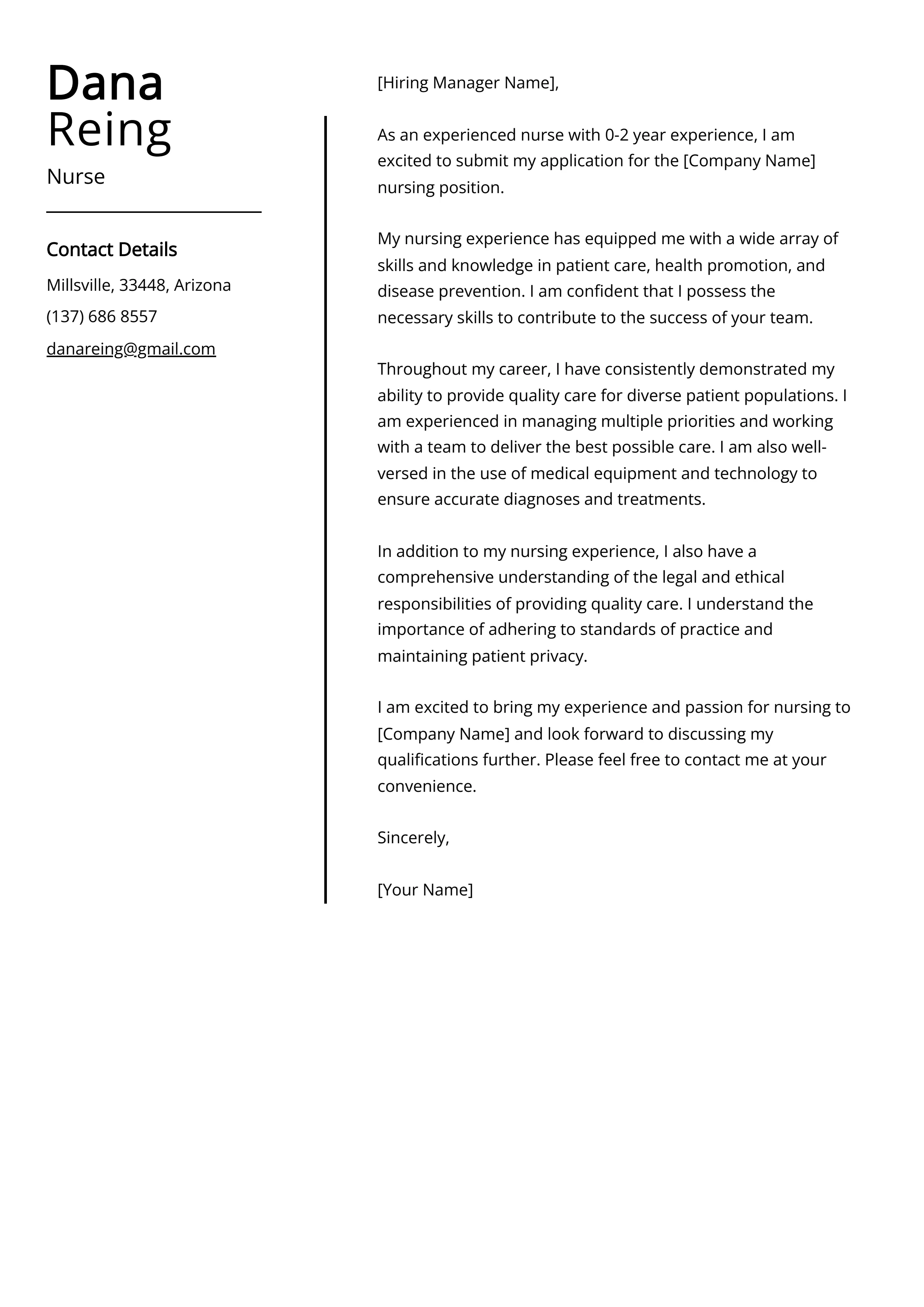
Always address your cover letter to a specific person whenever possible. Research the hiring manager’s name and title through the job posting, the company website, or LinkedIn. Addressing the letter to a specific person shows that you have taken the time to research the role and the organization, demonstrating your genuine interest. If you are unable to find a specific name, use a professional salutation such as “Dear Hiring Manager” or “Dear [Department Name] Team”. Avoid generic greetings like “To Whom It May Concern”, which can make your application feel impersonal.
The Opening Paragraph Grab Attention
The opening paragraph of your nurse cover letter is your first chance to make a strong impression. It should immediately grab the reader’s attention and entice them to continue reading. Start by clearly stating the position you are applying for and where you saw the job posting. Then, briefly highlight your key qualifications and express your enthusiasm for the role and the organization. Consider opening with a compelling statement that showcases your passion for nursing or a relevant achievement that demonstrates your suitability for the position. Make your first paragraph concise, engaging, and focused on what you bring to the table.
Highlighting Your Skills and Experience
This is the core of your cover letter where you connect your skills and experience to the job requirements. Review the job description carefully and identify the key skills and qualifications the employer is seeking. Then, provide specific examples from your experience that demonstrate how you possess these skills. Use action verbs to describe your accomplishments and quantify your achievements whenever possible. Show, don’t just tell, by providing concrete examples of your contributions and the positive outcomes you achieved. Be sure to align your experiences with the specific requirements of the role.
Quantifying Your Achievements
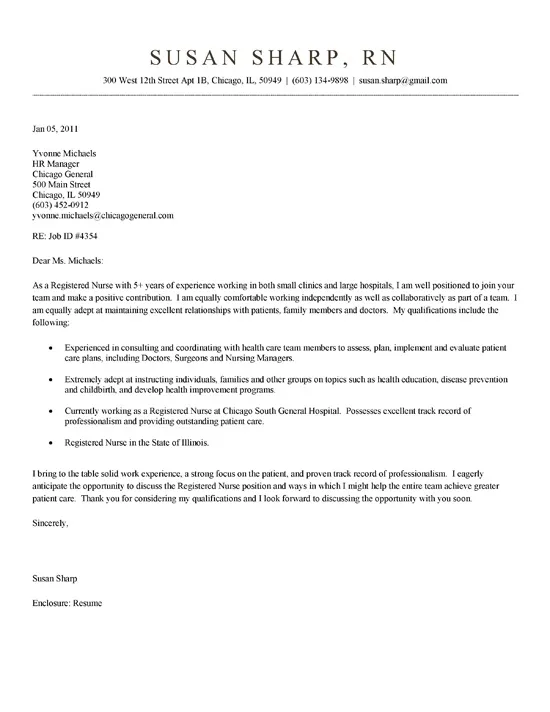
Whenever possible, quantify your achievements to demonstrate the impact of your work. Use numbers and statistics to illustrate your accomplishments, such as the number of patients you cared for, the percentage improvement in patient outcomes, or the amount of cost savings you achieved. For example, instead of saying “Improved patient satisfaction,” you could say “Increased patient satisfaction scores by 15% through implementing a new communication protocol.” Quantifying your achievements adds credibility to your claims and helps the hiring manager understand the tangible benefits you can bring to their organization.
Tailoring Your Letter to the Job
Customize your cover letter for each job application. Do not send a generic cover letter. Carefully review the job description and identify the key skills, experience, and qualifications the employer is seeking. Then, highlight the specific skills and experiences from your background that align with these requirements. Use the same keywords and phrases from the job description to demonstrate that you are a good fit for the role. Tailoring your letter shows that you have taken the time to understand the specific needs of the employer and are genuinely interested in the position.
Expressing Your Enthusiasm and Interest
Throughout your cover letter, express your enthusiasm for the role and the organization. Demonstrate your genuine interest in the position by mentioning specific aspects of the job that appeal to you. Explain why you are excited about the opportunity to work in that particular healthcare setting and how your values align with the organization’s mission. Showing your passion for nursing and your commitment to patient care can make a lasting impression on the hiring manager. Your enthusiasm will make you stand out and will signal that you are a good fit for the team.
The Closing Paragraph and Call to Action
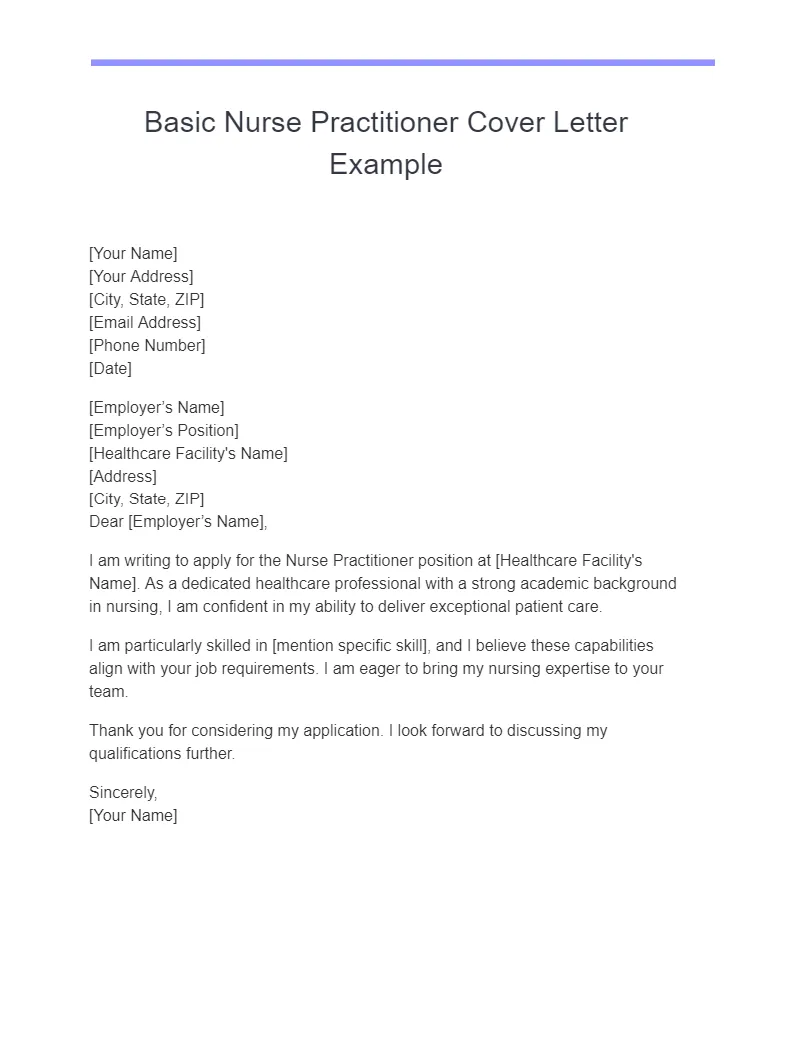
The closing paragraph of your cover letter should reiterate your interest in the position and thank the hiring manager for their time and consideration. Reiterate your key qualifications and briefly summarize why you are the ideal candidate. Include a call to action, such as stating that you are eager to discuss your qualifications further in an interview. Provide your contact information again and express your availability for an interview. End with a professional closing such as “Sincerely,” “Best regards,” or “Thank you for your time.” Make sure it is well-written and reflects your professionalism.
Formatting and Style Tips for Your Nurse Cover Letter
Font and Formatting Choices
Choose a professional and easy-to-read font such as Times New Roman, Arial, or Calibri. Use a font size between 10 and 12 points. Maintain consistent formatting throughout the letter, including consistent spacing, margins, and alignment. Use clear headings and subheadings to organize your content and make it easy to scan. Break up large blocks of text with short paragraphs and bullet points to improve readability. A clean, well-formatted letter demonstrates your attention to detail and professionalism. Make sure the font looks professional and is easy to read, making it simpler for the hiring manager to review your document, as shown in nurse-formatting-tips.webp image.
Proofreading and Editing

Proofread your cover letter carefully for any typos, grammatical errors, and spelling mistakes. Ask a friend or colleague to review your letter for clarity and accuracy. Ensure that your language is professional and that your tone is enthusiastic and confident. A polished and error-free cover letter reflects your attention to detail and demonstrates your professionalism. Proofreading can catch any errors that you may have missed. It is an important step in the writing process that can prevent mistakes from being submitted and ultimately lower your chances of getting hired.
Common Mistakes to Avoid in Your Nurse Cover Letter
Generic Letters
Avoid sending generic cover letters that are not tailored to the specific job or organization. Generic letters demonstrate a lack of interest and can make your application feel impersonal. Instead, customize your cover letter for each job application by highlighting the specific skills and experiences that align with the job requirements. Show that you have taken the time to understand the needs of the employer, as seen in nurse-mistakes-avoid.webp image.
Typos and Grammatical Errors
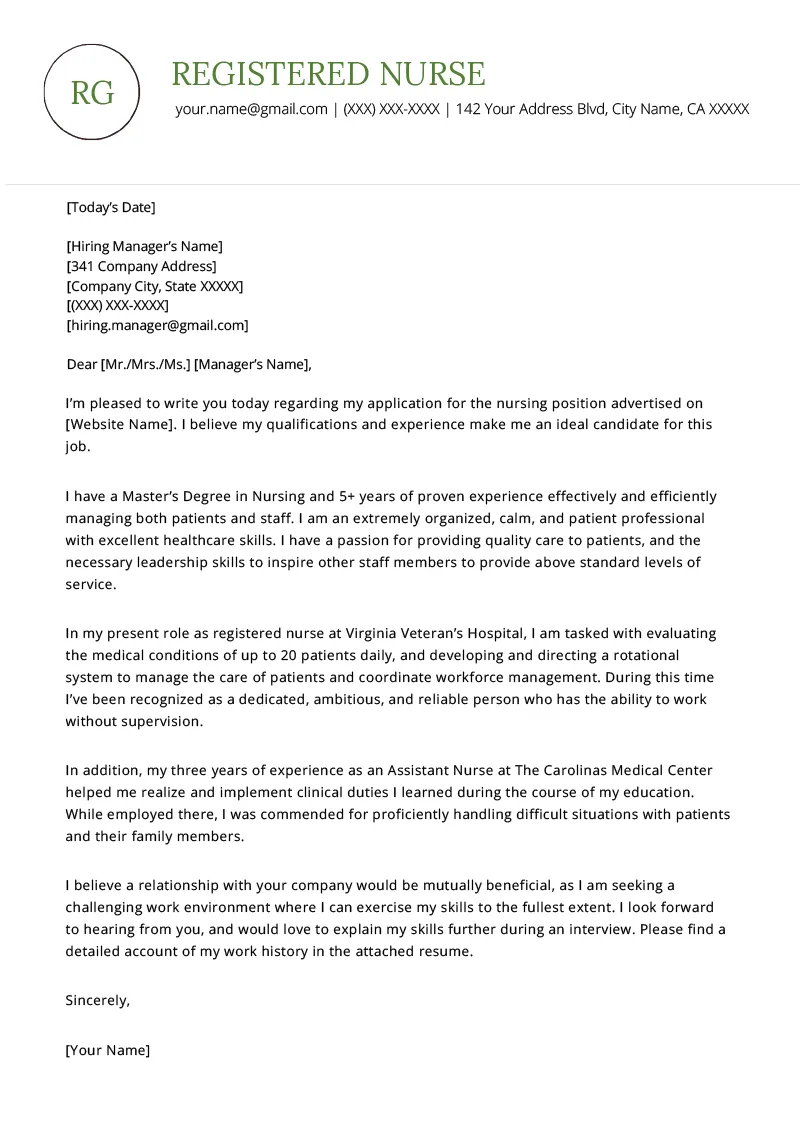
Typos and grammatical errors can undermine your credibility and make a negative impression on the hiring manager. Proofread your cover letter carefully and ask someone else to review it for accuracy. Ensure that your language is professional and that your writing is clear and concise. Errors can be distracting and can make it difficult for the hiring manager to focus on your qualifications.
Focusing Solely on Responsibilities
Instead of simply listing your job responsibilities, focus on highlighting your accomplishments and the positive outcomes you achieved. Provide specific examples of your contributions and the impact you made in your previous roles. Use action verbs to describe your achievements and quantify your results whenever possible. Your achievements showcase your value and demonstrate the benefits you can bring to the new position.
Showcasing Your Nurse Cover Letter with Action
Highlighting Relevant Skills
Emphasize the skills that are most relevant to the job requirements. Review the job description carefully and identify the key skills and qualifications the employer is seeking. Then, provide specific examples from your experience that demonstrate how you possess these skills, as shown in the nurse-skills-experience.webp image. Highlight your clinical skills, such as patient assessment, medication administration, and wound care. Showcase your soft skills, such as communication, teamwork, and problem-solving. Tailor your skills to meet the needs of the specific role.
Demonstrating Patient Care Experience
Provide detailed examples of your patient care experience. Describe the types of patients you have cared for and the specific care you provided. Highlight your ability to assess patients, develop care plans, and administer medications. Mention any specialized skills or certifications you possess, such as critical care, emergency care, or geriatrics. Show your compassion, empathy, and dedication to providing high-quality patient care, as seen in the nurse-patient-care.webp image.
Illustrating Teamwork and Communication Abilities
Nursing is a team sport, so highlight your ability to work effectively with other healthcare professionals. Provide examples of your teamwork skills, such as collaborating with doctors, nurses, and other staff to provide patient care. Demonstrate your communication abilities by describing how you communicate effectively with patients, families, and colleagues. Show your ability to listen actively, provide clear and concise information, and resolve conflicts. Your teamwork and communication skills are essential for creating a positive work environment and providing exceptional patient care, see nurse-teamwork.webp image.
Tips for Different Nursing Specializations
Cover Letters for Registered Nurses RNs
Registered Nurses (RNs) should highlight their clinical expertise, leadership skills, and experience in various healthcare settings. Showcase your certifications, such as those in critical care, emergency nursing, or medical-surgical nursing. Emphasize your ability to manage patient care, make critical decisions, and collaborate with interdisciplinary teams. Also, be sure to express your passion for patient care and your commitment to providing the best care possible, as shown in the nurse-specializations.webp image.
Cover Letters for Licensed Practical Nurses LPNs
Licensed Practical Nurses (LPNs) should highlight their clinical skills, experience in patient care, and ability to follow medical protocols. Emphasize your experience in assisting RNs and physicians with patient care, administering medications, and monitoring patient progress. Highlight your compassion, empathy, and ability to provide emotional support to patients and their families. Also, showcase your ability to work under the supervision of registered nurses and physicians.
Cover Letters for Nurse Practitioners NPs
Nurse Practitioners (NPs) should highlight their advanced clinical skills, leadership abilities, and experience in providing comprehensive patient care. Showcase your certifications, such as those in family practice, acute care, or geriatrics. Emphasize your ability to diagnose and treat illnesses, order and interpret diagnostic tests, and prescribe medications. Highlight your ability to work independently and as part of a healthcare team. Also, emphasize your experience in providing patient education, counseling, and preventative care.
Finalizing Your Nurse Cover Letter
Review and Submission
Before submitting your nurse cover letter, review it carefully to ensure that it is free of errors and that it meets all the requirements of the job posting. Proofread your letter for any typos, grammatical errors, and spelling mistakes. Make sure that your contact information is accurate and up-to-date. Customize your letter for each job application, highlighting the specific skills and experiences that align with the job requirements. Ensure your letter is well-formatted and easy to read. Finally, submit your cover letter with your resume and any other required documents. By following these guidelines, you can create a compelling nurse cover letter that will help you land your dream job in nursing.
